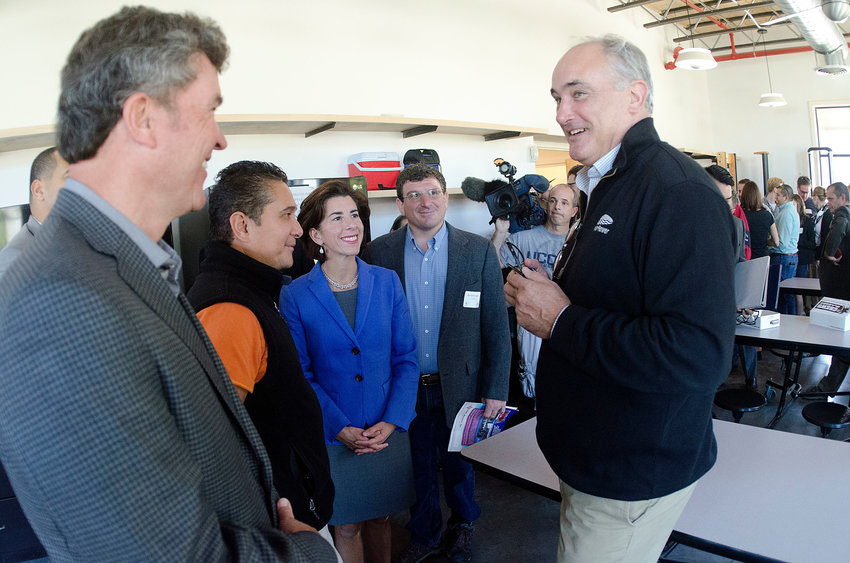Employers wrestle with question: To mandate vaccines, or not
Many private employers say they can’t, or don’t need to, mandate vaccines; here’s what they are doing instead
Two weeks ago, the president of the United States urged private companies to do what the federal government itself cannot do — require Americans to inject the Covid vaccines into their …
This item is available in full to subscribers.
Please log in to continue |
Register to post eventsIf you'd like to post an event to our calendar, you can create a free account by clicking here. Note that free accounts do not have access to our subscriber-only content. |
Day pass subscribers
Are you a day pass subscriber who needs to log in? Click here to continue.
Employers wrestle with question: To mandate vaccines, or not
Many private employers say they can’t, or don’t need to, mandate vaccines; here’s what they are doing instead
Two weeks ago, the president of the United States urged private companies to do what the federal government itself cannot do — require Americans to inject the Covid vaccines into their bodies.
“I’m calling on more companies in the private sector to step up with vaccine requirements that will reach millions more people,” President Joe Biden said in remarks at the White House. “If you’re a business leader, a nonprofit leader, a state or local leader, who has been waiting for full FDA approval to require vaccinations, I call on you now to do that — require it. It only makes sense to require a vaccine to stop the spread of Covid-19.”
The president’s words joined a growing chorus of voices, from large media outlets to medical experts, telling employers they have a duty to enforce mandatory vaccines on their employees.
Locally, every company has confronted the issue in one way or another. Some have ignored it entirely, whether out of ignorance or philosophy. Others have done so for practical reasons — why draft a policy when you have five employees and all are vaccinated?
Yet many more companies have implemented some form of vaccination procedures, to go along with mandatory Covid protocols. Many private schools have mandated vaccines for their faculty. Roger Williams University did so months ago, and they reported to campus last week with 97 percent vaccinated.
Large employers face the most pressure, as they have the most influence and perhaps the most to lose. These are complex decisions for an organization of any size, triggering thorny questions about policy-writing, legality, equity and corporate citizenship. Many don’t know what to do, and many certainly don’t want to talk about the issue publicly, risking rebuke from one group of citizens (and potential customers) or the other.
Half a dozen business leaders who were contacted for this story either never responded or declined to comment. One said the issue is too “politically charged.”
In the public realm, Bristol Town Administrator Steven Contente wrote a very brief email saying the town has “no intention” of requiring vaccines for employees.
Superintendent of Schools Bob Hicks Bob said he and his administrative team have not considered mandating vaccine among faculty and staff, where there is already a 90 percent vaccination rate. Mr. Hicks added that he is not afraid of the issue, but rather he is confident that staff will not be a point of transmission given the strong voluntary vaccination rate.
Three local employers responded to questions and talked about vaccination policies and the array of strategies they’re using to deal with Covid. None are mandating vaccinations. Here are their stories.
Blount Fine Foods – 300 jobs
Blount Fine Foods has about 1,300 employees and 300 job openings posted on Indeed.com. Like many restaurants, retailers and manufacturers, they can’t find enough workers to run facilities the way they would like to.
“If there was an excess labor market, possibly we would focus on mandatory vaccines,” said president and CEO Todd Blount, “but we are not considering it under these circumstances.”
“With 300 open roles right now, we just can’t. Even if we lost just five people, it would be difficult,” he said.
However, Blount is actively engaged in Covid policies and management. Mr. Blount said their corporate culture has always been “highly motivational,” with an element of fun and incentives, so they’re doing things to entice vaccinations. The company is paying $100 stipends once people are fully vaccinated. They’re hosting on-site vaccination clinics monthly. They’re also spending time educating employees and sharing information about the vaccines.
“We’re trying to walk the line, where we have the expectation that employees are getting vaccinated, but at the end of the day, it is truly voluntary,” Mr. Blount said. Nonetheless, their vaccination rate is increasing.
“We’re more than 60 percent vaccinated right now, and we’re heading toward 75 percent,” Mr. Blount said. The vaccination rate is higher at the corporate offices in Fall River, lower at the large manufacturing plant on Water Street in Warren, but they believe protocols are working.
Unvaccinated employees are required to wear masks at all times. Vaccinated employees can choose whether to wear them or not, but they are encouraged to.
They had been running their own Covid testing program, but they’ve pulled back on that and are instead focusing on symptoms. “We’re getting to good vaccination numbers, we’re not seeing a lot of positive cases, so we feel we’re doing ok,” Mr. Blount said.
WaterRower – 80 percent vaccinated
Peter King, president and CEO of WaterRower in Warren, said his firm will not be mandating vaccines.
“I don’t think Joe Biden’s got the right to mandate them, nor do I,” Mr. King said. “I don’t think it is my responsibility to mandate things like injecting a vaccine into someone’s arm.”
But he does believe the company has a responsibility to educate and encourage, which they have been doing for months. Mr. King reports that about 80 percent of their 350 employees are vaccinated.
Like his peer at Blount, Mr. King mentioned the weak labor market, where it is difficult to find qualified people willing to work. “If I pushed for mandatory vaccines, would we lose someone? I’m sure we would,” he said. “Some of these people, some engineers, we don’t want to lose them. They’ve very valuable people, with unique skills sets.”
Mr. King said WaterRower has made vaccinations as accessible as possible for employees. They brought a clinic into the building, they’ve bused employees to vaccination sites, and they’ve distributed educational materials in multiple languages.
With the arrival of the Delta variant, they’ve ramped up their in-house testing program, with every employee being tested weekly. They also require the non-vaccinated employees to wear masks throughout the work day, and they’ve created separate break areas for the vaccinated and unvaccinated.
Andrade Insurance – never going back
Mark Matrone, longtime president of the family-owned John Andrade Insurance company, is also not requiring vaccinations for their employees. He also doesn’t feel like he has to. He has a pretty good sense that a significant majority of employees are already vaccinated, and the anti-Covid measures they’ve adopted may become permanent.
Andrade has adopted a schedule where employees are in their offices two days a week and working remotely three days a week. Mr. Matrone is in the office every day.
As a result, there are never more than two or three people on any floor of either office (they have locations in Bristol and Warren) at any given time. The hybrid schedule has been a runaway success for employee health and morale. “I honestly feel that people have been much more productive, and they really enjoy the flexibility,” Mr. Matrone said. The new system may also help people feel more comfortable about actually working in an office environment.
“The bottom line is, we’re in a whole new environment with Covid. I don’t want people to be nervous about going to work,” he said.
Mr. Matrone knows of another agency that required all employees to return to work five days a week and lost four employees as a result. He also thinks their new hybrid schedule could be more attractive to younger workers. “Think about the difference for a young person, if they’re choosing between a place where they can work with a hybrid schedule or one where they have to be in an office five days a week.”
Mr. Matrone believes that as long as productivity remains high (and, yes, they have ways to measure it), Andrade will never go back to its old ways.
“There are reasons for people to be in the office, for networking, to have the older and younger employees learning from each other, to learn office etiquette … but they don’t need to be in the office five days a week,” he said.
He sees many benefits to the new system. “There will never be another snow day for Andrade,” he said. “My office will never be closed; every day, people are expected to be answering messages and responding to customers.”
He believes they are also being good corporate citizens. Fewer employees coming to the office means fewer cars on the road, less consumption of fossil fuels and less demand for utilities and services in their offices. It’s also led to a more relaxed dress code. Mr. Matrone, widely recognized for his sharp suits every day, has given up the tie and coat. “I am so much more comfortable. I don’t know if I’m ever going to wear a tie again,” he joked.
And there’s another silver lining from the pandemic — lower dry cleaning bills.










